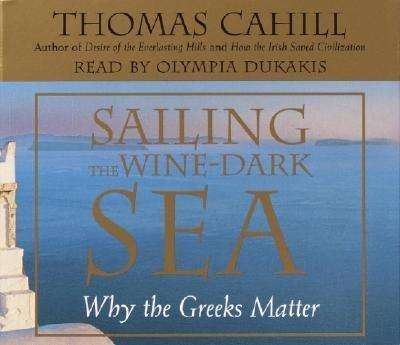Sailing the Wine Dark Sea: Why the Greeks Matter 6CDs 7 hours - ex-library SOLD AS IS
From Publishers Weekly
In this elegant introduction to Greek life and thought, Cahill provides the same majestic historical survey he has already offered for the Irish, the Jews and the Christians. He eloquently narrates the rise of Greek civilization and cannily isolates six archetypal figures representative of the development of Greek thinking. He opens with a consideration of Homer's Iliad and its glorification of the warrior way as an exemplum of life in the Greek state. Cahill then proceeds to offer an evolutionary look at the rise and fall of Greece by examining the wanderer (Odysseus), the politician (Solon), the playwright (Sophocles, Aeschylus, Euripides), the poet (Sappho), the philosopher (the pre-Socratics, Plato, Aristotle) and the artist (Praxiteles). These figures provide lessons in how to feel, how to rule, how to party, how to think and how to see. For example, Cahill contends that Odysseus reveals longing and desire for love, domestic peace and his homeland, while the rage of Achilles offers us lessons in the way to fight for one's homeland. The book is full of whimsical characterizations, such as the depiction of Socrates as a "squat, ugly, barefoot man who did not bathe too often." The author includes generous portions of the original writings in order to provide the flavor of the Greek way. Once again, Cahill gracefully opens up a world that has provided so much of Western culture's characteristic way of thinking.
Copyright 2003 Reed Business Information, Inc.
From School Library Journal
Adult/High School--Cahill has set himself a daunting task in Sailing the Wine-Dark Sea, in which he seeks to make the ancient Greeks accessible to a modern audience. Yet he succeeds. The author examines ancient Greek civilization through a number of specific roles that underpinned that society, such as the warrior, the politician, and the philosopher. He delves into their development and shows how they exemplified and perpetuated the different aspects of behavior and thought that defined their times. The use of specific types with whom readers can relate makes for an effective means of bridging the gap between their civilization and ours. With this common ground established, Cahill can show exactly how ancient Greece has influenced western civilization today, such as in the approach to the military and in the creation of the system by which we organize our knowledge and methods of learning. Scholars of the subject might quibble with certain of the author's pronouncements, and he seems to have an overly dismissive attitude toward the civilization of ancient Rome. Yet there can be no gainsaying the fact that Cahill has succeeded in his goal; by the end of the book, readers can thoroughly understand why the ancient Greeks matter to us today.--Ted Westervelt, Library of Congress, Washington, DC
Copyright © Reed Business Information, a division of Reed Elsevier Inc. All rights reserved.

